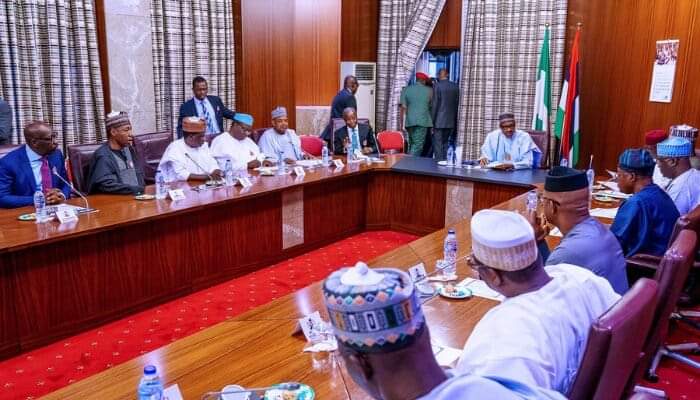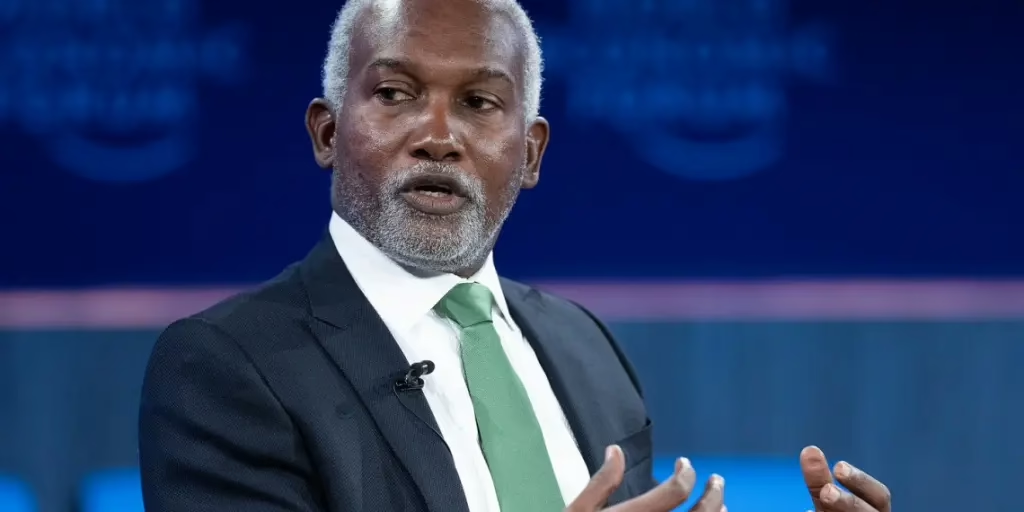Nigerian governors advised President Muhammadu Buhari-led’s government to take some urgent steps as part of coordinated efforts to instill fiscal discipline and prevent the nation from economic collapse.
1. Eliminate PMS subsidy/under-recovery – (N6-7 trillion)
2. Eliminate NNPC’s Federation-funded projects – (N300 billion)
3. Cap Social Investment Program (SIP) and National Poverty Reduction with Growth Strategy (NPRGS) budgets to N200 billion – (N570 billion)
4. Eliminate extra-constitutional deductions from FAAC – (N100 billion)
5. Reduce SWV items for SDG and NASS Constituency projects – (N300 billion)
6. Reduce duplications (e.g. empowerment programmes) and waste – (N100 billion)
7. Reduce 1 percent granted to NASENI to 0.2 percent. Amend the Act in the 2022 Finance Bill.
B. Reduce Personnel Costs of FG MDAs:
8. Offer federal civil servants above 50 years (a) one-off retirement package to exit the service – (N350 billion), and employ lower-cost, more ICT-compliant youths and women graduates.
9. Begin implementation of the updated Stephen Oronsaye Report – (N1 trillion)
10. Expedite privatization of non-performing assets. (Billions of Naira)
11. 2023 – 2025 MTEF to be revised and updated to reflect above expenditure management measures and Government’s commitment to restore fiscal discipline.
12. Planned 22 per cent increase in salaries in 2023 to be reconsidered.
13. Reduce fiscal deficit to no more than 2 per cent of GDP in 2023 – 2025.
14. Foreign trips by MDAs, including budgetary-independent agencies such as CBN, FIRS, NPA, NIMASA and NCC, etc. to be put on hold for at least one year.
15. Ministry of Foreign Affairs not to issue requests for Visas to foreign embassies for FGN officials and their families, unless express approval is granted by the Presidency.
16. Move from State Income Taxation to Consumption Taxation:
17. With the introduction of 3 per cent Federal Income Tax, state-level PIT should be abolished.
18. State Sales Taxes (flat rate of 10 per cent) should be enacted for the 36 States and FCT.
19. Increase VAT levels to 10 percent with a timeline to raise it to between 15 percent and 20 percent.
20. Ensure re-introduction and passage of VAT into the Exclusive List.
21. End CBN financing of FGN expenditures and convert the N19 trillion Ways and Means outstanding into 100-year, 1 per cent bonds immediately.
22. Introduce a flat 3 per cent Federal Personal Income Tax on all Nigerians earning more than N30,000 per month. – (N100 billion)
23. Persons earning less than N30,000 per month whether employed or not, including farmers and traders should pay a monthly FPIT of N100.
24. Telecom firms and NIMC should collaborate to ensure deduction of this from phone credit of individuals and linking to NIN and BVN.
25. Centralize the collection of all federal oil and non-oil taxes in one agency, the FIRS while Customs, NPA, etc assess and issue demands.
26. Improve offshore crude oil and gas production.
27. Resolve lingering issues of ownership of gas in PSCs (eg Nnwa-Doro, OML 129). This will help position Nigeria to take advantage of the gas needs in Europe.
28. Provide incentives and resolve issues to expedite development of vandalism-resistant deep offshore fields like Bonga SW (Shell), Preweoi (Total), Zabazaba (ENI) and Owowo (Exxon).
29. Encourage (and pre-finance, if necessary) Dangote Refinery to early completion to reduce massive future outflows of foreign exchange.
C. Central Bank of Nigeria
30. The Bank of Agriculture, Bank of Industry, and Development Bank of Nigeria should be recapitalised
31. Funds in NIRSAL controlled by CBN should be redirected to the Development Banks.
32: CBN should be directed to focus on its core and statutory mandate of exchange rate management, interest rate management and inflation targeting. It should
33. CBN’s subsidized interventions in the real sector should be ended and the relevant institutions recapitalized to provide these services.
The governors made the recommendations on the CBN after determining that the naira exchange rate has deteriorated because:
i. CBN has printed N19 trillion “Ways and Means” for FGN expenditures contrary to the CBN and Fiscal Responsibility Acts and in violation of the law.
ii. Trillions of Naira are chasing few billion dollars, putting pressure on the foreign reserves and the exchange rate.
iii. CBN’s ‘fixed exchange’ stance discouraged foreign investment (peak of $90bn investment commitments in 2018, to $20bn in 2021), and Diaspora inflows ($20 billion in 2022 to less than $17 billion in 2021)
iv. PMS subsidies under the guise of ‘under-recovery’ have wiped out virtually all accretions to the foreign reserves.
v. CBN has resorted to using swaps, deferred LCs, and other innovations to hide the real levels of charges on our foreign reserves – Gross of $36 billion vs. Net of $15 billion as at end of June 2022.
vi. Exchange rate policy now favours consumption by the rich – cheaper medical tourism ($3bn annually), education ($6bn annually) and business and technical services like aviation remittances, etc. ($15bn) in 2019.
StarnewsNG.











Leave a Reply